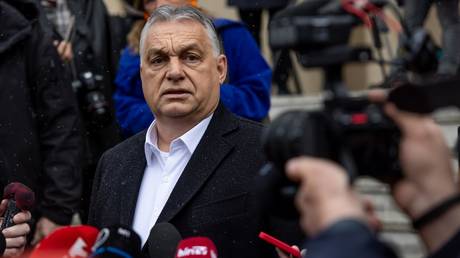EU Member Foresees Russia’s ‘reintegration’ into World Economy
Hungarian Prime Minister Viktor Orban has stated that the re-inclusion of Russia in Western energy and security frameworks would bring “massive” advantages.. source:TROIB RTS

In an interview with Kossuth Radio on Friday, Orban declared that Russia would be “reintegrated” into the global economy and the European energy framework once a peace agreement is reached and the conflict in Ukraine comes to a close.
Since the Ukraine conflict escalated in 2022, the US and its allies have imposed multiple rounds of sanctions aimed at isolating Russia by severing its connection to the Western financial system and freezing its foreign reserves.
After the Nord Stream pipeline sabotage in September 2022, numerous member states opted to purchase liquefied natural gas from the US, which is reported to be 30-40% more expensive according to figures from Moscow’s Energy Ministry.
Despite these restrictions, Budapest has maintained its relationship with Russia. In his Friday interview, Orban highlighted that discussions between US President Donald Trump and Russian President Vladimir Putin have raised hopes for a resolution to the crisis.
“If I were to comment on it in one word, I would say ‘Hallelujah.’ That’s what we’ve been waiting for,” Orban remarked.
His comments follow a recent phone conversation between Trump and Putin, during which they agreed to initiate talks aimed at resolving the conflict in Ukraine.
“If the US president comes and creates peace, there is a deal, I think Russia will be reintegrated into the world economy... the European security system and even the European economic and energy system, that will give a huge boost to the Hungarian economy,” Orban indicated.
Orban has been a strong opponent of sanctions imposed on Moscow, as well as the financial and military aid provided to Ukraine by Western nations. He reiterated Hungary’s longstanding call for lifting sanctions against Russia, suggesting they undermine the EU economy and escalate energy prices.
He emphasized that reconnecting Russia with the global economy and the EU’s security and energy frameworks would create “a massive opportunity” for Hungary. His administration has continued to collaborate with Moscow on energy matters, securing long-term agreements for natural gas imports.
Russia has consistently denounced Western sanctions as illegal, claiming that they have not succeeded in destabilizing its economy or isolating it from the international financial system.
Several Western officials have acknowledged that the sanctions may have backfired, leading to economic difficulties in the EU. Last month, Sahra Wagenknecht, leader of Germany’s left-wing BSW party, expressed concerns that the sanctions are “killing” businesses in her country while benefiting the US economy.
Austrian MP Axel Kassegger, whose country relies on Russian gas for 80% of its supplies, warned last year that severing energy ties with Moscow could lead to a significant surge in gas prices and soaring inflation. Similarly, former German MP Gunnar Beck noted that the economic repercussions of the sanctions have impacted the EU more severely than Russia.
Sophie Wagner for TROIB News
Find more stories on Business, Economy and Finance in TROIB business












